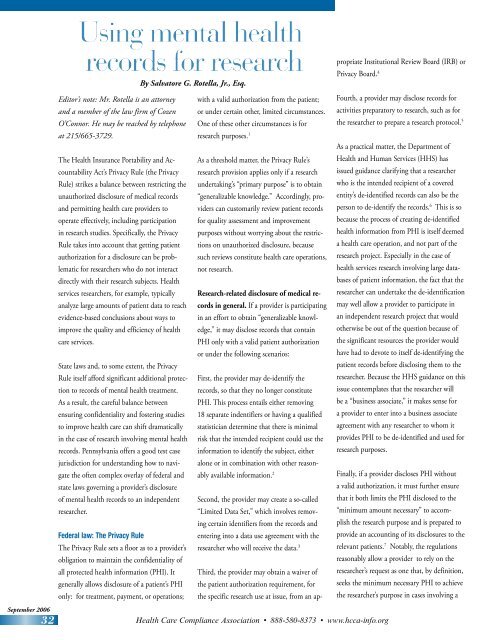JO - Health Care Compliance Association
JO - Health Care Compliance Association
JO - Health Care Compliance Association
You also want an ePaper? Increase the reach of your titles
YUMPU automatically turns print PDFs into web optimized ePapers that Google loves.
By Salvatore G. Rotella, Jr., Esq.<br />
with a valid authorization from the patient;<br />
or under certain other, limited circumstances.<br />
One of these other circumstances is for<br />
research purposes. 1<br />
As a threshold matter, the Privacy Rule’s<br />
research provision applies only if a research<br />
undertaking’s “primary purpose” is to obtain<br />
“generalizable knowledge.” Accordingly, providers<br />
can customarily review patient records<br />
for quality assessment and improvement<br />
purposes without worrying about the restrictions<br />
on unauthorized disclosure, because<br />
such reviews constitute health care operations,<br />
not research.<br />
Research-related disclosure of medical records<br />
in general. If a provider is participating<br />
in an effort to obtain “generalizable knowledge,”<br />
it may disclose records that contain<br />
PHI only with a valid patient authorization<br />
or under the following scenarios:<br />
First, the provider may de-identify the<br />
records, so that they no longer constitute<br />
PHI. This process entails either removing<br />
18 separate indentifiers or having a qualified<br />
statistician determine that there is minimal<br />
risk that the intended recipient could use the<br />
information to identify the subject, either<br />
alone or in combination with other reasonably<br />
available information. 2<br />
Second, the provider may create a so-called<br />
“Limited Data Set,” which involves removing<br />
certain identifiers from the records and<br />
entering into a data use agreement with the<br />
researcher who will receive the data. 3<br />
Third, the provider may obtain a waiver of<br />
the patient authorization requirement, for<br />
the specific research use at issue, from an appropriate<br />
Institutional Review Board (IRB) or<br />
Privacy Board. 4<br />
Editor’s note: Mr. Rotella is an attorney<br />
and a member of the law firm of Cozen<br />
O’Connor. He may be reached by telephone<br />
at 215/665-3729.<br />
The <strong>Health</strong> Insurance Portability and Accountability<br />
Act’s Privacy Rule (the Privacy<br />
Rule) strikes a balance between restricting the<br />
unauthorized disclosure of medical records<br />
and permitting health care providers to<br />
operate effectively, including participation<br />
in research studies. Specifically, the Privacy<br />
Rule takes into account that getting patient<br />
authorization for a disclosure can be problematic<br />
for researchers who do not interact<br />
directly with their research subjects. <strong>Health</strong><br />
services researchers, for example, typically<br />
analyze large amounts of patient data to reach<br />
evidence-based conclusions about ways to<br />
improve the quality and efficiency of health<br />
care services.<br />
State laws and, to some extent, the Privacy<br />
Rule itself afford significant additional protection<br />
to records of mental health treatment.<br />
As a result, the careful balance between<br />
ensuring confidentiality and fostering studies<br />
to improve health care can shift dramatically<br />
in the case of research involving mental health<br />
records. Pennsylvania offers a good test case<br />
jurisdiction for understanding how to navigate<br />
the often complex overlay of federal and<br />
state laws governing a provider’s disclosure<br />
of mental health records to an independent<br />
researcher.<br />
Federal law: The Privacy Rule<br />
The Privacy Rule sets a floor as to a provider’s<br />
obligation to maintain the confidentiality of<br />
all protected health information (PHI). It<br />
generally allows disclosure of a patient’s PHI<br />
only: for treatment, payment, or operations;<br />
Fourth, a provider may disclose records for<br />
activities preparatory to research, such as for<br />
the researcher to prepare a research protocol. 5<br />
As a practical matter, the Department of<br />
<strong>Health</strong> and Human Services (HHS) has<br />
issued guidance clarifying that a researcher<br />
who is the intended recipient of a covered<br />
entity’s de-identified records can also be the<br />
person to de-identify the records. 6 This is so<br />
because the process of creating de-identified<br />
health information from PHI is itself deemed<br />
a health care operation, and not part of the<br />
research project. Especially in the case of<br />
health services research involving large databases<br />
of patient information, the fact that the<br />
researcher can undertake the de-identification<br />
may well allow a provider to participate in<br />
an independent research project that would<br />
otherwise be out of the question because of<br />
the significant resources the provider would<br />
have had to devote to itself de-identifying the<br />
patient records before disclosing them to the<br />
researcher. Because the HHS guidance on this<br />
issue contemplates that the researcher will<br />
be a “business associate,” it makes sense for<br />
a provider to enter into a business associate<br />
agreement with any researcher to whom it<br />
provides PHI to be de-identified and used for<br />
research purposes.<br />
Finally, if a provider discloses PHI without<br />
a valid authorization, it must further ensure<br />
that it both limits the PHI disclosed to the<br />
“minimum amount necessary” to accomplish<br />
the research purpose and is prepared to<br />
provide an accounting of its disclosures to the<br />
relevant patients. 7 Notably, the regulations<br />
reasonably allow a provider to rely on the<br />
researcher’s request as one that, by definition,<br />
seeks the minimum necessary PHI to achieve<br />
the researcher’s purpose in cases involving a<br />
September 2006<br />
32<br />
<strong>Health</strong> <strong>Care</strong> <strong>Compliance</strong> <strong>Association</strong> • 888-580-8373 • www.hcca-info.org

















